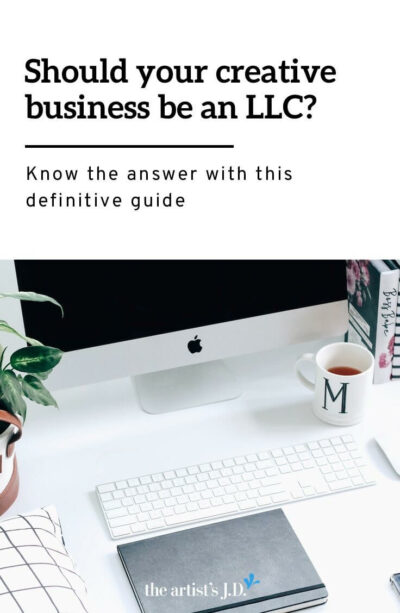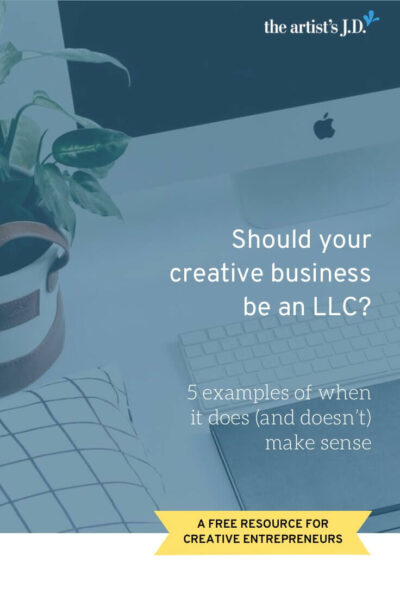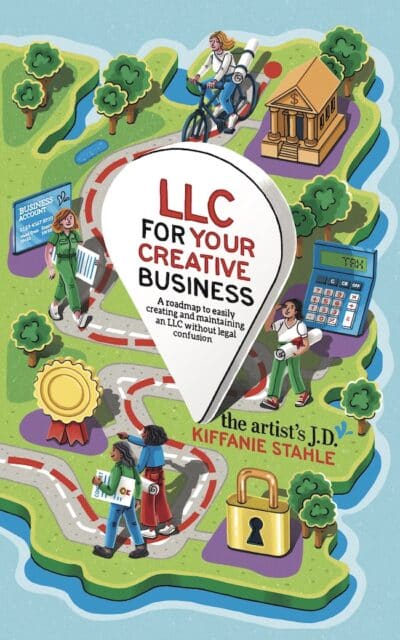
The goal of this resource is to share the secret to knowing if it’s time for your creative business to become an LLC.
By the end, you should be able to answer a set of questions and know if now is the right time to become an LLC. (And if not, when you should revisit your decision.)
Why should you trust me?

You might not know who I am. So, why should you trust what I say?
Hi! I’m Kiffanie Stahle, founder of the artist’s J.D. A place designed to add ease to the legalese of running your creative business.
In addition to running the artist’s J.D., I am a licensed California attorney. And day in and day out, I’m helping my clients run successful, thriving creative businesses (with all their legal ducks in a row).
Since at a certain point many creative businesses transition to an LLC, creating LLCs is a regular part of my practice. In fact, over the past 10+ years, I’ve formed hundreds of California LLCs.
So it’s safe to say that I know a thing or two about when it is (and isn’t) a good idea to transition your business into an LLC.
Table of Contents
In this resource, you’ll find…
There’s no one-size-fits-all answer
First off, there’s no formula that you can plug information into and it will spit out “Yes, you need to be an LLC.” or “Nope! You can stay how you are for now.”
You also can’t look at your friend’s business and think, “She’s an LLC, so I need to be one too.”
The decision that an LLC is/isn’t right for your creative business depends on:
- your own comfort with risk
- the kind of business you run
- your goals/plans for your business
- your family situation
- your debt situation
- what you own
- what state you run your business in
- how settled you are in that state
So while this is a DIY resource, it’s not an equation or formula-driven one. I can’t hand you a cookie cutter that will let you know if you are in or out.
Instead, what I can give you is tools, resources, and questions you’ll be able to use to arrive at the right answer for you and your business.
Got legal overwhelm? Learn how to protect your ass(ets) without legal confusion

Deciding if an LLC is right for your creative business is just one of the action items I help you complete as part of the Legal Roadmap. It’s a straightforward strategy to get all your legal ducks in a row.
When you buy the Legal Roadmap, you’ll get the easiest way to build your business on a solid legal foundation.
(If you use the above Amazon affiliate link, I’ll make a small commission, but it doesn’t change the price you pay.)

Do you know why LLCs matter?
Before we dive into the questions, I want to make sure you understand why LLCs matter.
Short version, LLCs put a fence up between your personal life and business life. So if anything goes wrong, it stays on its own side of the fence.
Long version, What’s the big deal with LLCs?
LLCs are one of four legal business types:
- sole proprietorship
- partnership
- LLC
- corporation
The first two, sole proprietorship and partnership, you automatically become as soon as you start offering your services or selling your products. The only distinction between the two is if you are doing it by yourself or with one or more friends. If you are going at it alone, you are a sole proprietorship. If you are doing it with friends, a partnership.
But to become an LLC or a corporation you have to file paperwork with your state.
The reason businesses become LLCs and corporations is for the legalese concept of “limited liability.”
What limited liability does is erect a fence between your business and personal life. So when problems crop up, they stay on their side of the fence.
But this fence only exists in certain circumstances.
Your LLC fence will protect you if:
- a studio visitor slips and falls
- your relationship with your employee goes sour
- someone’s business tanks after taking your course
- your client isn’t happy with the quality of your work
- you (or your spouse or child) gets sick and you can’t pay your hospital bills
- your spouse is laid off and you can’t pay your household bills
But your LLC fence won’t protect you if:
- your landlord requires you to personally guarantee your lease
- you sign a contract as you not your LLC
- you use your home or another asset as collateral for a loan or line of credit
- you (or your employee) commits copyright infringement
- you don’t disclose the whole financial truth when getting a loan or line of credit for your LLC
- you don’t follow the legal LLC requirements
LLCs can give you tremendous peace of mind. But come with expectations and costs. And they aren’t right for every business.

Want to dive in deeper?
- Want to know how you’ll need to sign a contract once you are an LLC? Watch this to learn exactly what your signature block should look like.
- Can you create an LLC if your business isn’t financially self-sufficient? Watch this to learn how much money your business needs to be an LLC.
But Kiff, what’s an s-corp?
Above, I only listed four types: sole proprietorship, partnership, LLC, and corporation.
But you might be thinking, what about an s-corp? I keep hearing about that. How come you didn’t list it?
An s-corp is an IRS-only designation that determines how your business is taxed.
And both LLCs and corporations can tell the IRS that they want to be taxed as an s-corp.
s-corp is not a legal designation.
It’s not a way you can “create” your business.
It’s only a way to possibly reduce your tax bill come April each year.
Okay, now that we are all on the same page about what LLCs can and can’t do for your business, we are ready to dive in!
Your LLC shouldn’t be your only line of defense
An LLC will put a fence between your personal life and your business life if things go wrong.
But you don’t want something to go wrong on the LLC side and force you to close your business.
This is why your LLC shouldn’t be the only way that you protect yourself and your business.
You also should have:
- business liability insurance
- a limitation of liability clause in your terms of service or client contract
- waivers if you teach workshops
- processes to properly source images that you post on your blog or social media accounts
And you should rely on these things before you rely on your LLC status to protect your business.
Because your LLC status gives you the peace of mind that your personal assets are protected, not your business ones. And these things give you peace of mind that your business assets are protected.

Want to dive in deeper?
- Business liability insurance is one of the 5 must-do legal tasks I think every creative business needs to tackle. Sign up for my free email course that helps you tackle each of these tasks.
Mama Bears are the secret to knowing if you should be an LLC
My secret tool to knowing if it’s time for my client’s business to become an LLC has to do with mama bears.
Before I went to law school I was a wildlife biologist.
And one summer I worked in Yosemite. My job was to help discover how to best deter bears from campgrounds. (Which if you’ve ever visited our National Parks, you know is an issue.)

After this summer, I have a good relationship with bears. I know how to interact with them so they don’t see me as a threat. I know how to talk to them. All without my heart or breath skipping a beat.
The only time I get nervous is if I come across bear cubs and don’t know where their mom is.
And that’s because a Mama bear is incredibly protective of her cubs. And she will fight nearly to death to protect them.
So the secret to knowing when it’s time to become an LLC is to think about those things in your life that you are incredibly protective over. Those things that you would fight hard to protect if anything went wrong in your business.
Maybe this is your:
- home where you are raising your family
- savings account that you slaved away at a 9-5 job to build up so you could transition to full-time in your business
- spouse’s income (if you live in a community property state) that you are relying on to support your family while you build your business
If you can think of things that would make you sick to your stomach to lose if something went wrong in your business, then it might be time to become an LLC.
And while this question might do it for you, it isn’t the end all be all. So what other questions should you answer?
Balance the answers to these 10 questions to decide “I should be an LLC”
The reason that I can’t give you a formula, is because the decision is a balancing act.
This decision goes back to the old scales. Where you have to weigh both sides and see which side is heavier. And the side that’s heavier is the right decision.
On one side, you consider your risks, on the other your personal assets.
This means if you have substantial personal assets, like a home, stocks, or significant savings then even if your risk is low, changing over to an LLC might be a good idea.
If you have little personal assets (or are in debt) then it would take a greater risk before the switch to an LLC makes sense.
Question #1: Business owners
How many owners will your business have?
If there will be one owner, draw a line down the partnership column and eliminate that from contention.
If there will be more than one owner, draw a line down the sole proprietorship column and eliminate that from contention.
Question #2: Owner’s roles
Will all of the owners actively work in the business?
If all the owners will not actively work in the business, then place a checkmark in the LLC column.
If all the owners will actively work in the business, don’t add any checkmarks.
Question #3: Lenders or Investors
Will your business be seeking an SBA/bank loan or investors?
If so, place a checkmark in the LLC column.
If not, don’t add any checkmarks.
Question #4: Revenue
Do you expect your business net revenue to be greater than $20,000 next year?
(Excluding what you pay yourself.)
If so, place a checkmark in the LLC column.
If not, don’t add any checkmarks.
Question #5: Assets
Do you own any significant assets that you want to protect (e.g. home, car, stocks)?
If so, place a checkmark in the LLC column.
If not, place a checkmark in the other remaining column.
Question #6: Risk of lawsuit
Does your business run a high likelihood of being sued?
For example, your studio or space is open to the public, you make cosmetics, or the intended audience of your products or services is children.
If so, place a checkmark in the LLC column.
If not, don’t add any checkmarks.
Question #7: Employees
Do you have employees? If not, do you plan on hiring employees in the next year?
If so, place a checkmark in the LLC column.
If not, don’t place any checkmarks.
Question #8: Taxes
Do you want to minimize self-employment taxes?
If so, place a checkmark in the LLC column.
If not, don’t place any checkmarks.
Question #9: Legacy
Do you want your business to continue to operate without you?
If so, place a checkmark in the LLC column.
If not, don’t place any checkmarks.

Question #10: Red Tape
Do you want to avoid filing paperwork (and paying a filing fee) with your state on an ongoing basis?
If so, place a checkmark in the other remaining column.
If not, place a checkmark in the LLC column.
Tally up your answers
Once you’ve answered all ten questions, total up the number of check marks in each column.
The column with this highest number indicates which side the scales might be heavier on.
If you’ve got a tie, then think about your risk versus your assets, to decide if having an LLC as an “insurance” policy is worth it.
Examples of when it does (and doesn’t make sense)
Molly the Maker will create an LLC

Our first example is Molly the Maker.
Molly runs a product-based business and is looking to bring on part-time production help. And Molly found an art student that will be perfect to help with production.
The student’s primary role will be packaging and shipping out the orders from Molly’s online store and Etsy shop. So mostly the student will be using things like scissors, packaging tape, printer labels, and plastic sleeves.
Molly also knows that it’s incredibly difficult to call production help anything but an employee, so she knows that this team member has to be an employee of her business.

Want to dive in deeper?
- Calling team members independent contractors when they are legally employees is one of the biggest mistakes creative business owners make. Read this to learn how to decide the right name for your team member.
Finally, Molly’s studio is in her home, so the student will be coming to her house to work a few days a week.
Molly decides for her own peace of mind she’ll create an LLC because:
- she’ll have an employee
- she owns her home
- last year’s net revenue was $72,000
Courtney the Coach will create an LLC

Courtney helps busy women create meal plans that nourish their bodies and souls.
Courtney rents her apartment and still is paying off credit card debt from when she first started her business, so her car is her most expensive asset.
Recently, a coach friend of Courtney’s had a nasty experience with a client who had health issues that cropped up while they worked together. Courtney’s friend had to hire a lawyer and ended up paying the client several thousand dollars to make it all go away.
Courtney knows that she isn’t comfortable with risk. And it made her sick to her stomach to watch her friend go through this situation.
Even though she could minimize her risk by including a limitation of liability waiver in her contract, she’s going to create an LLC to give her added peace of mind.
Thomas the Teacher won’t create an LLC

Thomas creates online courses that teach other business owners how to take photographs that tell the story of their brands.
Thomas’ courses are doing well and he is earning nearly $80,000 per year.
Thomas spoke with his accountant about s-corp taxation. And he and his accountant agreed that it wouldn’t save him money yet to make this election.
Since Thomas’ courses don’t carry many risks, he doesn’t have any employees, and he won’t save any money, Thomas isn’t going to create an LLC at this time.
Instead, he’s going to update his course terms of service to include a limitation of liability clause. And he’s going to get business liability insurance to cover any unexpected risks.
Thomas will continue to check in with his accountant each year, and when an s-corp election will save him money, he’ll make the transition to an LLC.
Frank the Freelancer won’t create an LLC

Frank’s web design business has been operating for two years. And while he’s had some good months, he’s also had some months where he wasn’t sure how he was paying rent.
Frank is still paying off his student loans and has some credit card debt. And at this point in time, Frank’s net worth is solidly negative.
Frank’s major risk is getting sued for creating a website that infringes on another brand.
Rather than creating an LLC now, Frank is going to do two things:
- add a limitation of liability clause to his client contract that limits his liability to what Frank has been paid for his services
- get business liability insurance that includes intellectual property coverage, so if another brand claims Frank’s designs infringe on theirs, he can have his insurance company deal with it
And then when Frank’s business stabilizes or he pays off his debts, he’ll reassess if becoming an LLC makes sense.
Claire the Curator will create an LLC

Claire has been operating an online store where she sells homewares designed by others.
Claire’s store has been a wild success and she’s decided to move into a brick and mortar space.
While Claire has been successful, in order to open a physical location she’ll either need a loan or a silent investor.
Claire’s mother has offered to invest in Claire’s business so that she can open the store, with the requirement that to protect her own home and savings, Claire must create an LLC.
To protect her mother’s other assets, Claire will create an LLC.
Got legal overwhelm? Learn how to protect your ass(ets) without legal confusion

Deciding if an LLC is right for your creative business is just one of the action items I help you complete as part of the Legal Roadmap. It’s a straightforward strategy to get all your legal ducks in a row.
When you buy the Legal Roadmap, you’ll get the easiest way to build your business on a solid legal foundation.
(If you use the above Amazon affiliate link, I’ll make a small commission, but it doesn’t change the price you pay.)
Your next steps:
- Do you have multiple brands or businesses? Watch this video to learn if they can all go in the same LLC.
- Did you decide that it’s time to become an LLC? Then head here to learn the six steps required to create your LLC.
Are you overwhelmed by the legal jargon associated with creating an LLC for your creative business?

Do you wish you had a straightforward roadmap to feel confident that you created your LLC right (and know the expectations to keep it legit)? Then this is the book for you!
When you buy LLC for Your Creative Business, you’ll get my step-by-step guidance through the process of creating and maintaining an LLC for your creative business without all the legal confusion.
(If you use the above Amazon affiliate link, I’ll make a small commission, but it doesn’t change the price you pay.)
